Robert F Kennedy Jr is due to announce his “path forward” amid reports in US media that he will end his independent presidential bid and endorse Donald Trump. Trump and his running-mate JD Vance said they would support Mr Kennedy ending his campaign to align with their Republican ticket against Democratic nominees Kamala Harris and Tim Walz.
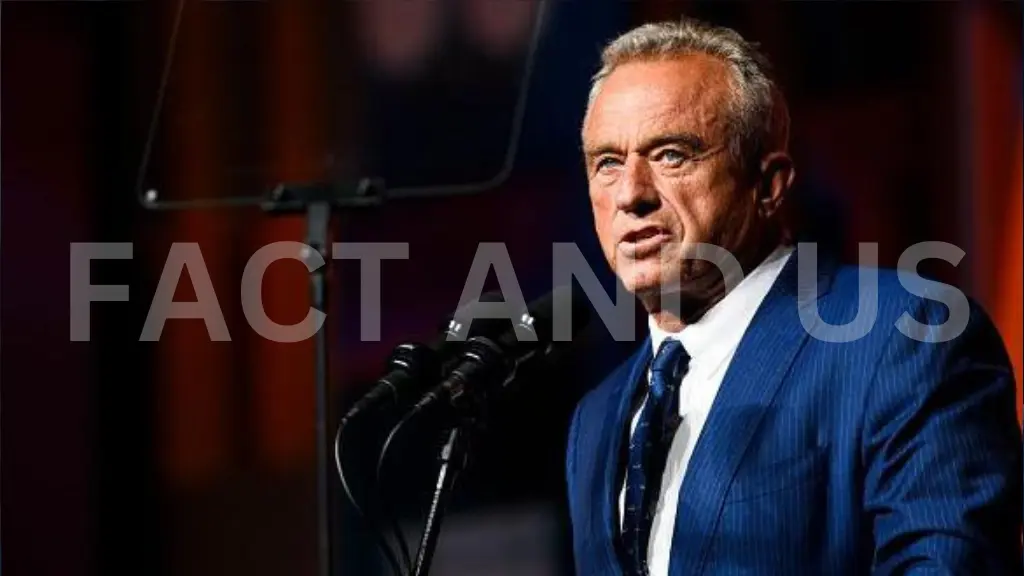
Mr Kennedy is due to “address the nation” from Phoenix in Arizona at 14:00 ET (19:00 BST) on Friday, a day after he filed to withdraw his candidacy in the state.
Trump is due to hold a rally in nearby Glendale hours later. His campaign said it would include a “special guest”, and Trump told Fox News it was “possible” the pair would meet. The ABC and NBC networks reported on Wednesday that Mr Kennedy would use his address on Friday to endorse Trump. CBS, the news partner in the US, quoted two sources as saying that he was “considering ending his presidential candidacy”.
Mr Kennedy’s withdrawal from Arizona follows comments on Tuesday from his running mate, Nicole Shanahan, that he was considering joining forces with Trump. Mr Kennedy said soon after on X/Twitter that “as always, I am willing to talk with leaders of any political party to further the goals I have served for 40 years in my career and in this campaign. “Trump indicated he was open to the idea of joining forces with Mr Kennedy, telling CNN: “If he is thinking about getting out, certainly I’d be open to it. He’s a brilliant guy. He’s a very smart guy.”
Mr Vance said on Wednesday that it would be “good” if Mr Kennedy dropped out and joined forces with the former president. He clarified on Fox & Friends that he has not spoken to Mr Kennedy about the potential move. Trump’s son, Donald Trump Jr, meanwhile told conservative radio host Glenn Beck that he would “love the idea” of Mr Kennedy joining a future Trump administration.
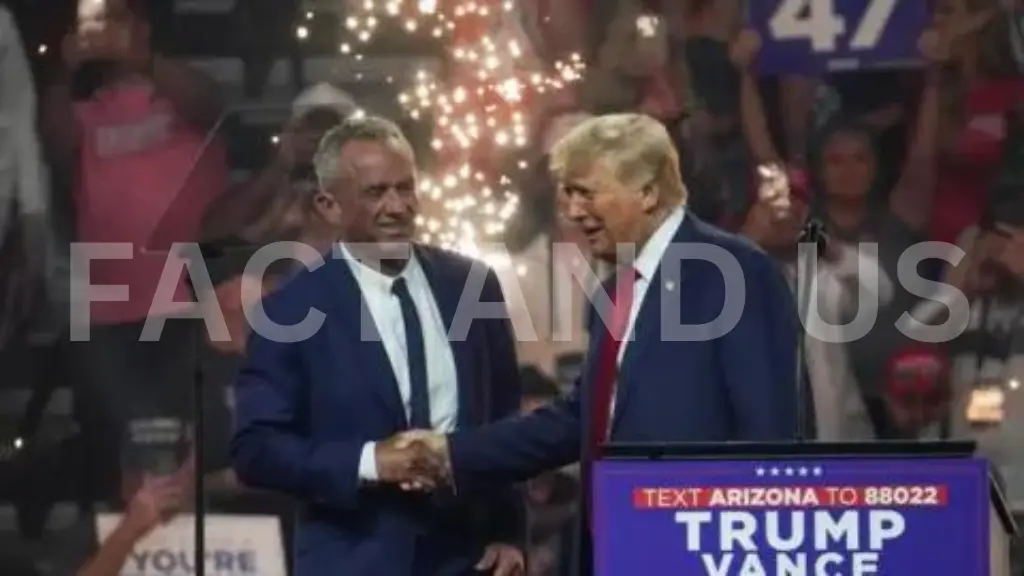
“I love the idea of giving him some sort of role in some sort of major three-letter entity or whatever it may be and let him blow it up,” he said. Mr Kennedy, 70, has faced a number of hurdles in his longshot campaign, from legal challenges over getting his name on state ballots to funding his run.
Media reports over the last few months have indicated that he has offered to endorse Trump in exchange for a role in his next administration.
A leaked phone call in July between the two candidates had Trump saying he would “love” Mr Kennedy “to do something” to support him. MS Shanahan’s comments to the Impact Theory podcast on Tuesday began the latest round of speculation. She said he was considering two options to combat the “risk” of a Harris presidency – dropping out and joining Trump, or staying in and forming a third party. She claimed the Democrats had “planted insiders” in their campaign, “manipulated polls” and “sued us in every possible state”.
“There’s two options that we’re looking at and one is staying in, forming that new party, but we run the risk of a Kamala Harris and [Tim] Walz presidency because we draw votes from Trump, or we draw somehow more votes from Trump,” Ms Shanahan, 38, said. “Or we walk away right now and join forces with Donald Trump and you know, we walk away from that and we explain to our base why we’re making this decision.”
She said it was “not an easy decision” but added that she trusted Trump more than Ms Harris with the future of the country. On the podcast, she rejected recent reports that the Kennedy campaign had been in talks with the Harris team about a potential endorsement or cabinet position.
The Harris campaign chairwoman, Jen O’Malley Dillon, told Politico that she was not worried if Mr Kennedy endorsed Trump.
“We are very confident that [Ms Harris] is going to win whether she’s running against one candidate or multiple candidates. I don’t think it’s really going to interfere with the race too much,” she said.
For the better part of the past year, as Robert F. Kennedy Jr. built and maintained a small but significant base of support for his quixotic White House bid, the two major parties wrestled with an increasingly pressing question: Whose presidential aspirations might be most damaged by an independent aligned with the conspiratorial right but bearing a famous Democratic name?
Now, with Kennedy on the cusp of exiting the race, both parties will be closely watching who his followers gravitate toward in the closing months before Election Day.
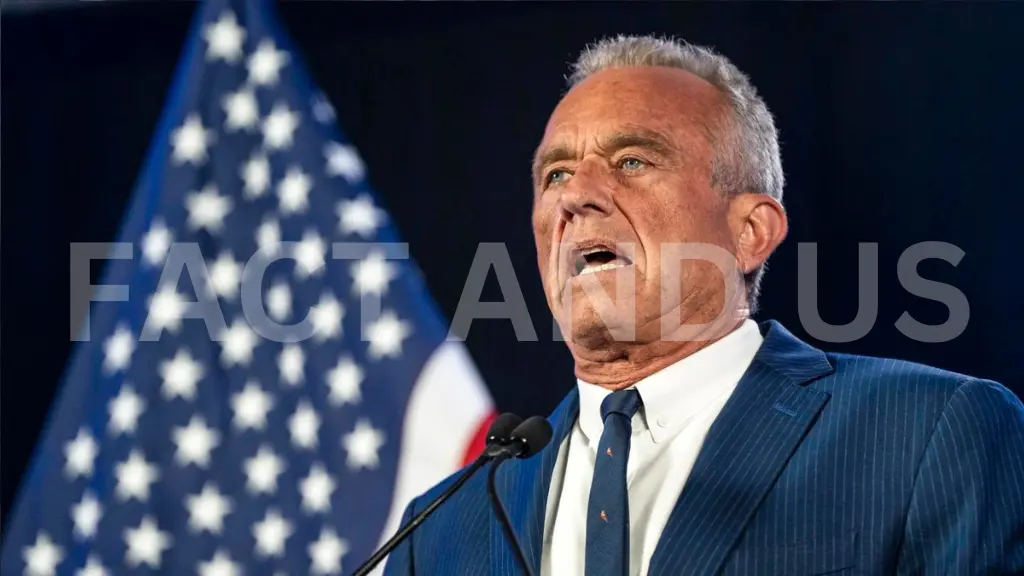
Kennedy is expected to formally announce Friday that he is suspending his presidential campaign. Speculation has already turned to whether Kennedy might endorse former President Donald Trump, an outcome that as of Thursday appeared likely though not guaranteed. Both candidates are scheduled to appear in Arizona on Friday, and Trump teased a “special guest” at his event.
Though his odds of victory were quickly diminishing – a recent CBS News poll measured his support at just 2% – Kennedy’s decision to bow out 74 days before the election nevertheless presents another twist to a race already unlike any other. And amid a momentum shift that has catapulted the newly installed Democratic nominee, Vice President Kamala Harris, into close contention with Trump, there is hope within the former president’s operation that Kennedy’s exit could prove decisive if certain battlegrounds are decided by thousands of ballots, just as they were in 2020.
It’s hardly certain what Kennedy’s backers will do. Whether many of them ever intended to vote for him or at all is difficult to gauge, and some may choose to sit the election out without an alternative on the ballot.
Still, the Trump campaign has long worried that Kennedy’s campaign, built on conspiracies and anti-vaccine rhetoric, pulled directly from their side, especially in a handful of key states. Trump’s advisers now see an opening to court some of Kennedy’s voters, particularly those Americans who sit at the overlap between supporters of Vermont Sen. Bernie Sanders’ past presidential campaigns and the GOP’s anti-establishment right wing. There is a presumption among Trump’s team and his allies that conservative-leaning mothers – a demographic the Republican nominee has struggled to win over – could also be swayed. Women were more likely to support Kennedy than men, according to a recent Pew Research Center survey, though other polls haven’t shown a meaningful difference.
Contents
An alternative to Biden and Trump
Kennedy first entered the race in April 2023 as a Democratic challenger to President Joe Biden. In October, he ended that bid and announced he would instead run as an independent candidate.
Armed with a storied family lineage – he’s the son of the late Attorney General Robert F. Kennedy and the nephew of President John F. Kennedy – and a cult following from his years of environmental activism and as a leading purveyor of debunked vaccine conspiracies, Kennedy quickly found an audience of Americans disenchanted by the two major parties and a rematch between the two oldest presidents to hold the office.
Though his national support peaked in the teens and has lately fallen to low single digits, Kennedy’s campaign generated fears from both parties that he could tip a critical state or two.

At the Republican National Convention last month, Trump co-campaign manager Chris LaCivita told a room full of reporters that their internal polling predicted Kennedy siphoned slightly more votes from Democrats in Michigan and Wisconsin but “much more from us” in Pennsylvania, whose 19 Electoral College votes are one of this year’s top prizes and could determine the election.
Asked why, LaCivita responded, “I don’t know. I haven’t figured it out yet.”
Democrats, meanwhile, have waged an offensive against Kennedy over the past year, seeking to portray him as a spoiler for Trump by highlighting his ties to megadonor Timothy Mellon, who has donated to super PACs backing both Trump and Kennedy.
The DNC and Clear Choice PAC actively fought Kennedy’s efforts to get on the ballot in 11 states, each of them a battleground or a Democratic stronghold. Kennedy had won all of the legal battles he faced against Democrats in various states up until a New York judge blocked him from appearing on the state’s ballot earlier this month.
Kennedy’s campaign and its underdog operation had spent countless hours, not to mention tens of millions of dollars, working to achieve their goal of gaining ballot access nationwide. Kennedy has qualified for the ballot in 21 states, although it’s unclear whether his name will appear on ballots in those states without him in the race. On Thursday, he withdrew from the ballot in Arizona, the office of the state’s secretary of state told CNN.
If Kennedy drops out, he will have spurned several minor parties who nominated him as their presidential candidate to grant him ballot access in select states. The fate of those minor parties, who in some states earn ballot access based on performance in previous elections, could be in jeopardy.
From a nuisance to a real problem
Trump’s campaign went on offense early against Kennedy’s independent bid, labeling him a radical liberal and promoting his more progressive beliefs. The attacks escalated further in the spring of 2024 as more public and internal polling revealed that Kennedy took as much support from Trump as from Biden.
By May, Trump’s advisers and outside allies went from viewing Kennedy as a nuisance to a real problem that needed extinguishing. Trump himself personally weighed in, urging undecided Americans not to cast a “wasted protest vote.”Within Trump’s political orbit, an alliance with Kennedy was never far from a possibility.
Roger Stone, the longtime Republican operative close to the former president, suggested in the summer of 2023 that Kennedy could be a contender for a Cabinet post in a second Trump term. In April, a Kennedy campaign official based in New York was fired by the campaign after she repeatedly urged voters to vote for Kennedy to improve Trump’s chances of victory in blue states such as New York. To Democrats, the episode confirmed what they viewed as an uncomfortable coziness between the efforts behind Trump and Kennedy.
Privately, the lines of communication remained open between their extended political orbits. Discussions between Trump allies and advisers and Kennedy’s team began in the lead-up to the Republican convention in July. Kennedy’s son, Bobby Kennedy III, posted video of a friendly phone call between his father and Trump the same month.
During the conversation, the former president appeared to endorse false theories about the safety of vaccines – a longtime focal point of Kennedy’s public advocacy. The elder Kennedy apologized to Trump for the release of the video of their phone call, which was later deleted.
At an event last month, Kennedy acknowledged for the first time that his path to victory was shrinking and asserted that Trump was “highly likely to be the next president.”
Frustration mounted as well with the friendly coverage Kennedy enjoyed into the summer from conservative media – not only Fox News and Newsmax but also among conservative influencers.
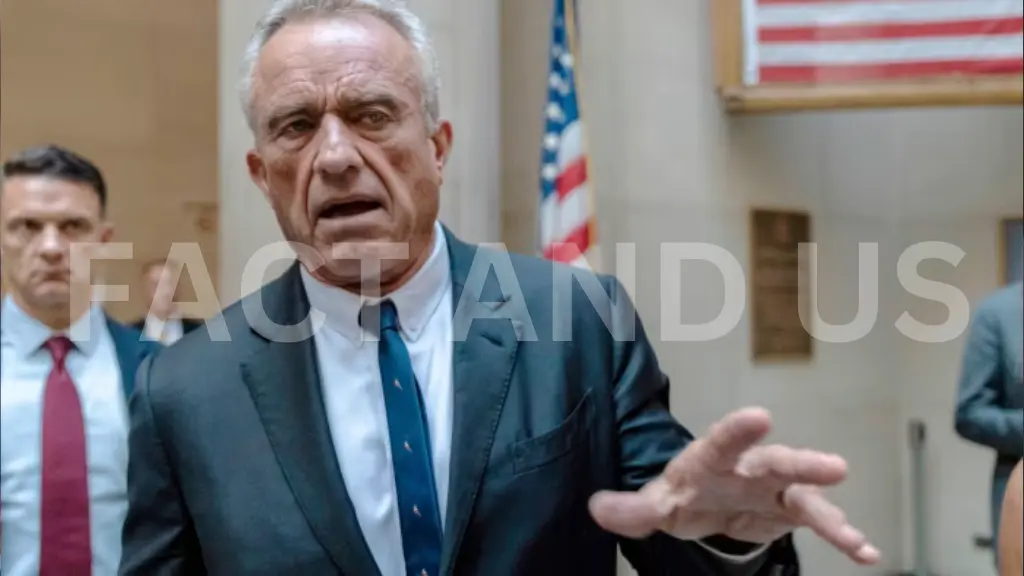
“That coverage was a major reason Don Jr. began pushing for a way to get (Kennedy) to end his campaign,” a source familiar with the talks said.
A mercurial figure
Internal conversations within Trump’s operation had for months focused on whether Kennedy’s endorsement would bring any benefit. Kennedy was a mercurial figure long before his run for president, and he has managed to amass more controversies during his 16-month-long quest for the White House.
In May, Kennedy disclosed for the first time that a parasitic worm once entered his brain and died, a period that led to “brain fog” and “having trouble with word retrieval and short-term memory,” he said. Later in the campaign, he sidestepped accusations published in Vanity Fair that he sexually assaulted a former nanny, telling a podcast he had “many skeletons in my closet.”
“I’m not a church boy,” Kennedy said when asked about the allegations.
The same Vanity Fair article also published an image of Kennedy, sent by him to a friend, which appeared to depict Kennedy pantomiming eating a dog carcass. Kennedy has denied the photo showed him eating a dog. Earlier this month, Kennedy’s campaign approached the vice president’s campaign about arranging a meeting to discuss endorsing her in exchange for a potential role in a Harris administration. That meeting never materialized.
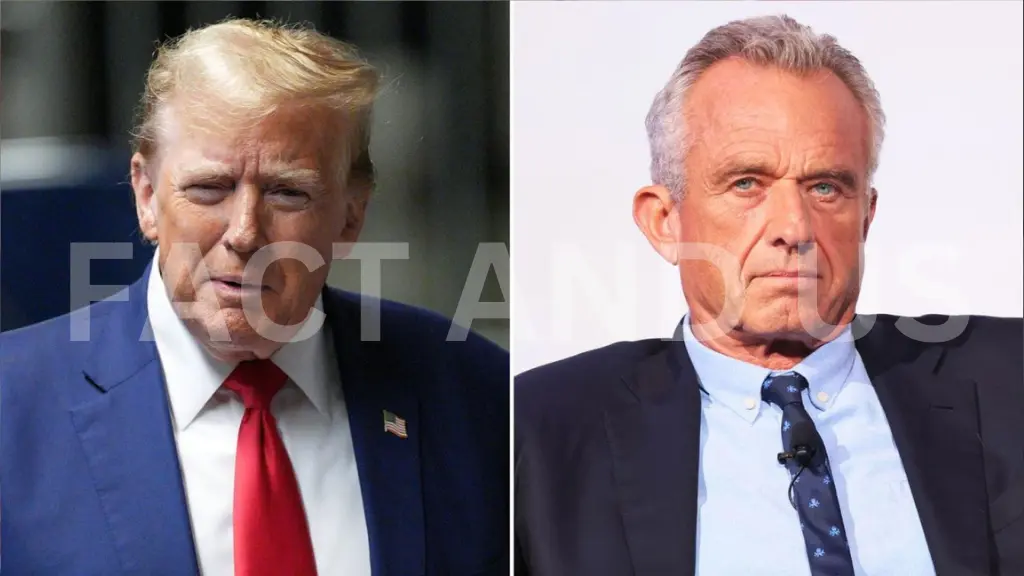
Shanahan on Thursday lashed out at Democrats, suggesting they would be to blame if Kennedy’s supporters helped push Trump over the top in November. Her “old Dem buddies,” she wrote on social media, are “terrified of the idea of our movement joining forces with Donald Trump. ”Here’s an idea: stop suing us. Let us debate. Quit rigging the media and the polls. It’s a simple formula people – get with it,” Shanahan said.
Stay connected with Fact and US for more such news.
